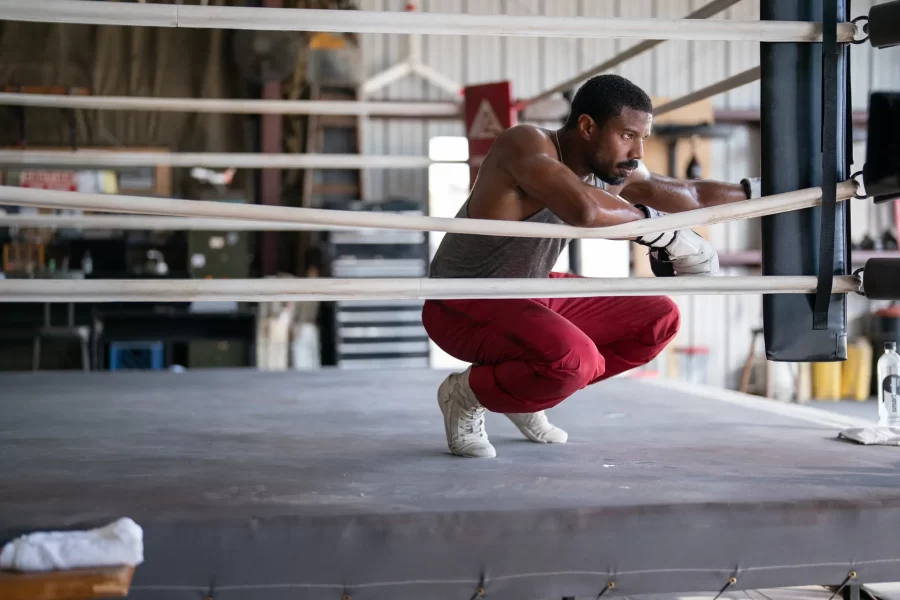Review: ‘Creed III’ holds its own in the ever-expanding sea of blockbuster fare
Michael B. Jordan plays Adonis Creed in “Creed III.” “Creed III” manages to thrive on a plethora of knock-out performances and sharp direction — elements that often tend to be absent from comparable films. Photo courtesy Ser Baffo of Metro Goldwyn Mayer Pictures.
March 14, 2023
Over the past decade, once-beloved, dormant franchises — “Jurassic Park,” “Top Gun” and “Halloween,” just to name a few — have returned to the silver screen, yielding mixed results. Building upon the legacy of “Rocky” and its many sequels, the “Creed” films have, unlike others, consistently enraptured series devotees and first-timers alike, standing as an exemplar of these nostalgia-based revivals. Its latest entry, directed by and starring Michael B. Jordan, reaffirms why such acclaim is deserving.
In “Creed III,” famed boxer Adonis Creed (Jordan) has entered retirement to spend time with Bianca (Tessa Thompson), his devoted wife and a celebrated musician, and Amara (Mila Davis-Kent), his deaf daughter with an inherited penchant for violence. However, when Damian Anderson (Jonathan Majors), Adonis’ childhood friend with a history behind bars, remerges, he is forced back into the ring for one final showdown.
As with its predecessors, the promise of tension-filled boxing sequences is a key draw for audiences and, despite there being fewer of them than anticipated, Jordan’s film somehow surpasses such a lofty expectation, a remarkable feat given that the sports drama serves as the actor-turned-filmmaker’s directorial debut. Inspired by anime, the fights in this MGM release are gorgeously shot and dynamic throughout, with Jordan’s use of slow motion and close-ups accentuating every grimace-inducing blow.
The movie’s climactic match between Adonis and Damian abandons realism as the raucous spectators, critical judges and concerned family members suddenly vanish, leaving only the fighters in their wake. In doing this, Jordan puts the viewer into the minds of the combatants, conveying that the duo is, despite the deafening hollering of attendees, laser-focused on the task at hand.
Besides his commendable and frequently refreshing direction, Jordan delivers another flawless portrayal of the titular role. He perfectly exhibits his character’s frustration regardless of how it manifests; his anger is tangible whether through a ferocious punch or an incisive insult. That said, Jordan’s Adonis does not merely show outrage, as he displays compassion for his struggling daughter, gratitude for his supportive romantic partner and — prior to their falling out later in the film — brotherly love for his recently-freed friend.
Majors, hot off the heels of a fascinating turn in the otherwise underwhelming “Ant-Man and the Wasp: Quantumania,” also provides an engrossing performance as the antagonistic Damian. He expertly exudes his character’s pent-up rage and determination, crafting what is undoubtedly Adonis’ most formidable foe to date and, rather uniquely, one whose intimidation is perhaps felt more outside of the ring than in it.
For instance, after Damian defeats heavyweight champion Felix Chavez (José Benavidez Jr.), Adonis confronts him at an outdoor party. There, Damian’s yet unseen intellect is revealed, as he explains he has been manipulating his former pal to achieve success in the boxing world. Majors plays this moment with delicious cunning, conveying — through posture and speech pattern alone — that Damian is greatly satisfied by what he has done.
Although “Creed III” sports a multitude of impressive attributes, it is occasionally bogged down by an overstuffed screenplay. Written by Keenan Coogler and Zach Baylin — from a story drafted by the pair and Ryan Coogler, the driving force behind the original “Creed” film and the “Black Panther” duology — the film attempts to address Adonis’ tense marital struggles, conflicts with his ailing mother (Phylicia Rashad), declining mental health and complicated friendship with Damian, amongst other issues. As a result, not every storyline is given an equal amount of focus, leaving some severely underdeveloped.
In particular, the portions of the movie dedicated to the development of Adonis and his mother’s bond feel rushed. Granted, their relationship has frequently fallen to the wayside in these films, as, outside of the initial entry, little time is dedicated to the two. But, especially considering what transpires at the film’s midpoint, additional scenes were needed to flesh out this mother-son connection. Ultimately, had certain threads been eliminated — and, instead, been saved for another sequel or spin-off — the film’s script would have been far more cohesive.
Though its content-crammed writing somewhat weakens it, “Creed III” manages to thrive on a plethora of knock-out performances and sharp direction — elements that often tend to be absent from comparable films.












